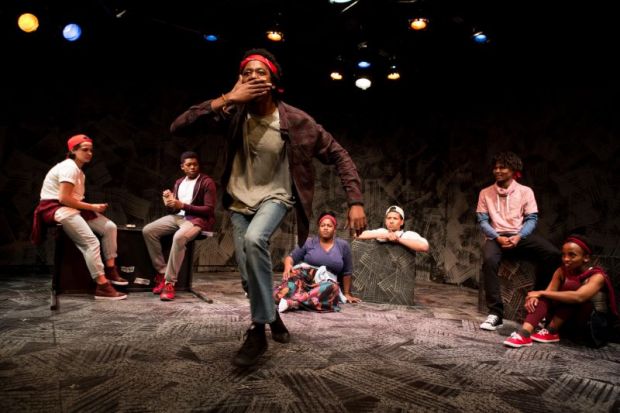It’s difficult to reflect in the midst of an insurrection. The Fall, a play that narrates South Africa’s student uprisings and has run at the University of Cape Town’s Baxter Theatre Centre throughout October, offers a chance to do just that.
Here’s the cast’s account of their project: “For The Fall, we were inspired by the success of our 2015 student production of Black Dog/Inj’Emnyama. We thought that if Barney Simon and cast could so eloquently tell the stories of the student protests of 1976, why can’t we do the same with our own experiences of the protest movements of 2016? Our objective in creating this piece is to share what it is like to be people of colour at Cape Town; to show the internal processes of both the movements and individuals in the movement, and open up the issues that have provoked some of the protests such as #RhodesMustFall, #FeesMustFall and #PatriarchyMustFall. Overall, we hope to grow dialogue and understanding between the student movements and the general public.”
The theatre is close to the university’s administration building, an epicentre of protests, confrontations, tear gas and stun grenades and the torching of cars by night. The triumph of The Fall is the ability of its gifted cast to reflect on the immediate circumstances that are shaping their lives. All new to professional theatre, they are hard-hitting but self-critical. They have written their play from their own experiences as students and activists. They close with an expression of determination and fatigue.
Watching The Fall, I remembered a similar production – The Queen is Dead – staged in Manchester in April 2014. This was a critical reflection on the riots across British cities in August 2011. No apology for destructive violence, this play also explored the deep contradictions in making a life. As with The Fall, The Queen is Dead was built around the narratives of those caught up in the politics and protests of the moment. The play dissected the deathly coupling of violence and response, forcing a pause for reflection on easy assumptions.
The case for the arts – here theatre – has been made many times but no amount of repetition is too much. Productions such as The Fall and The Queen is Dead prise open spaces for critical reflection, for slowing down the pace, if only for 90 minutes, forcing thought and reappraisal. In Manchester, the chief superintendent responsible for policing a large part of the city region came to a performance with some of her officers; she said afterwards that she’d been inspired to rethink some of her assumptions about policing methods. In Cape Town, many in the audience of sold-out performances have, like me, spent long years in higher education, shaping aspects of the system that is now under acute criticism. We leave wondering how we could have betrayed a generation. It was hard listening, given added force by the combination of passion and professionalism. Performances have earned their standing ovations.
In 1996, the Kenyan writer Ngũgĩ wa Thiong’o gave a series of talks as part of the Clarendon Lectures at the University of Oxford, subsequently published as Penpoints, Gunpoints, and Dreams: Towards a Critical Theory of the Arts and the State in Africa.
Here is Ngũgĩ’s sense of the place; of the play between his critical writing and the presentation of it in Oxford’s redolent celebration of past and recent conquests: “It is impossible to walk through the streets of Oxford without being conscious of history all the time. A huge portrait of Queen Elizabeth I hangs from the wall of the dining room in Jesus College and it was as if it was rebuking me for my unfortunate reference, in my lecture ‘The Allegory of the Cave’, to her edict of 1601 in which she had called for the expulsion of black people from her realm. I stayed in Somerville College…our apartment was next to Margaret Thatcher Court. Lady Thatcher had been a graduate of Somerville, and again I felt another rebuke for claims in my other writings that the capitalist fundamentalism of which she and Reagan were the leading apostles was wrecking social havoc in the world and generating other forms of fundamentalism in opposition or in alliance.”
Here, and in later writing, Ngũgĩ developed the concept of orature, a form of engaged performance that embraces words, images and physical presences that shape our sense of being. There is a direct connection between Ngũgĩ’s sense of material oppression in Oxford and the current campus insurrection in South Africa: The Fall’s point of departure is the toppling, in April last year, of the statue of Cecil Rhodes that has long dominated UCT’s public facade.
The qualities of orature also well describe the visceral power of this performance. There’s a moment of silence in the play when the statue is gone, the dust still in the air, when the cast of seven breathes out in relief, growing into the space freed from the burden of history. We sense here, perhaps more than in any words, the same burden that weighed down Ngũgĩ in Oxford; the urgent need of this contemporary generation to be free of the unbearable heaviness of history.
There are no answers in The Fall and nor can there be; answers need the passage of time to hear causes and effects through all the noise. But there are many questions: class, race and gender; intersectionality and masculinity; everyday acts of wounding discrimination; violence as strategy; the humiliation of poverty and the burden of indebtedness. It is a particular talent of this cast to express both their unity and the fractures that divide them while engaging their audience in a creative discomfort. It forces us to reappraise.
There is, as yet, no solution in sight across any of the key issues of dissent. In the 24 hours before the performance that I attended, four cars were burned out nearby on the campus and the university obtained a court interdict against any further demonstrations. On the day after, more than 5,000 students faced off riot police outside Cape Town’s parliament buildings. But the determination to be heard is clear and persistent. As one line from the play put it: “When we didn’t have the words, we found new ways to express ourselves.”
Martin Hall is emeritus professor in the Graduate School of Business, University of Cape Town, and former vice-chancellor of the University of Salford. The Fall runs at the Baxter Theatre Centre, University of Cape Town, until 29 October.
Register to continue
Why register?
- Registration is free and only takes a moment
- Once registered, you can read 3 articles a month
- Sign up for our newsletter
Subscribe
Or subscribe for unlimited access to:
- Unlimited access to news, views, insights & reviews
- Digital editions
- Digital access to THE’s university and college rankings analysis
Already registered or a current subscriber? Login









